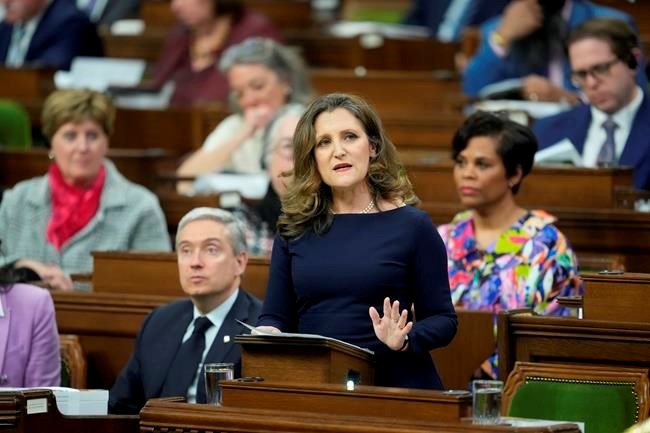TORONTO — The federal budget pushed forward several banking sector initiatives, including open banking and lower fees, but had little detail on when changes would actually take effect.
Open banking was one of the more closely watched areas by the financial industry. Also called consumer-driven finance, it would allow consumers to securely share their financial data across institutions and apps to take advantage of services like budget management and wider loan options.
Consumer advocates and fintech companies have been pushing for a rapid adoption of the system, already in place in dozens of countries, to give more choice and potentially lower costs.
In the budget, the government committed to introducing some of the necessary legislation this spring and the remaining elements in the fall, and designated the Financial Consumer Agency of Canada to oversee it, but did not specify a target implementation date.
"We would have liked to see a formal launch date for the open banking framework," said EQ Bank chief executive Andrew Moor in a statement.
He said the bank would have also liked to see a higher level of investment in the system to ensure its success.
The federal government committed $1 million in this fiscal year to help the FCAC get started, and earmarked $4.1 million over three years for the Finance Department to complete the necessary policy and oversight work.
Using the existing FCAC, rather than setting up a new agency, should however save time and money, said Saba Shariff, chief strategy, product and innovation officer at Symcor Inc., a business process service provider.
"The naming of it, I think is much faster than completely setting up something new," said Shariff.
She said it was very expensive for the U.K. to set up a new agency when it rolled out its system that cost hundreds of millions of pounds.
The lack of specified timing though does present a challenge for companies hoping to prepare for the new system, she said.
"Every organization that's going to participate in this framework needs to know how many months they're dealing with."
The lack of timing on implementation is also something shared with other banking initiatives.
The government committed to capping non-sufficient funds fees at $10, down from the $45 to $50 range the big banks generally charge. It also plans to bring in additional protection measures, such as alerts when a consumer might be charged, prohibiting multiple NSF fees on the same transaction and not allowing charges on overdraws under $10.
The budget said the government would release draft regulation on the measure in the coming months, but no target date for when the new rules might be in place.
Despite the lack of a date, the news was welcomed by anti-poverty advocacy group ACORN Canada.
“At last, low- and moderate-income people are getting a break from corporate gouging," said leader Alejandra Ruiz Vargas in a statement.
The government's efforts on enhancing free and affordable bank accounts are more vague.
The budget said the government plans to negotiate wider access to low- and no-cost bank accounts, and have more services added to them. It said it would direct the FCAC to secure new agreements with providers including the big banks.
While the government launches new initiatives, advocates are still waiting for it to implement ones already in the works, including reducing the maximum allowed interest rate from 48 per cent to 35 per cent on an annual percentage rate. Draft regulations were published in December, but it's not clear when the rate will be lowered.
In the budget, the government committed to going further to protect against what it calls predatory lending, announcing that it will lift a requirement that the Attorney General has to approve prosecutions of illegal and predatory lending.
It says it will also work with provinces, who have jurisdiction over much of the payday loan space, to cap the cost of insurance, improve pricing transparency and enhancing data collection.
The Canadian Bankers Association said it is still reviewing the budget to assess its implications.
This report by The Canadian Press was first published April 17, 2024.
Ian Bickis, The Canadian Press




